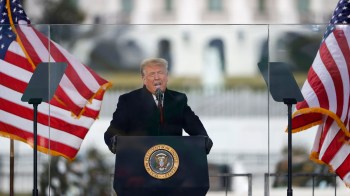Can U.S. debt negotiators learn from Greece?
JEREMY HOBSON: President Obama is heading to Pittsburgh today but he’s got a big project waiting for him when he gets back to Washington — getting the debt ceiling talks back on track after Republicans walked out of negotiations yesterday. Lawmakers were hoping to reach a deal by July 4 to raise the federal borrowing limit by $2 trillion in exchange for an equal amount of spending cuts and or tax increases. Meanwhile another big story debt crisis markets are focused on that would be Greece, where we got some good news: international lenders are on board with Greece’s deficit cutting plans.
For more on all of this let’s bring in Marketplace’s Stephen Beard in London and Marketplace’s Nancy Marshall Gezner in Washington. And Nancy, first to you. After the republican walkout yesterday, where do the debt talks in Washington stand?
NANCY MARSHALL GENZER: Oh they’re definitely at an impasse. House Majority Leader Eric Cantor was one of the two Republicans who walked out of the talks yesterday basically pushing this up to the higher level of President Obama and House Speaker John Boehner. Now they’re going to have to negotiate. And from what Cantor said yesterday, it seems everything is coming down to the tussle over tax hikes and spending cuts.
ERIC CANTOR: I don’t see how multiple votes on a debt ceiling increase can help get us where we want to go. Which is we want big reforms, we want big spending cuts, and big changes to how this town works.
HOBSON: OK, so we have an impasse in Washington. Now Stephen Beard over in Europe, a little good news perhaps for Greece. How do these two debt crises compare?
STEPHEN BEARD: Well, I’d say the Greek debt crisis is much worse in two ways. First of all the Greeks owe more than 150 percent of their GDP. What’s the equivalent figure for the U.S.? Seventy percent. And ironically the Greek debt crisis poses a bigger global threat than the U.S. problem. The big risk is that if Greece defaults, that could trigger defaults in other euro zone countries like Ireland, Portugal, Spain. And that could bring down the whole Euro, causing absolute market mayhem. I don’t think anyone at this stage thinks the U.S. dollar, however, is likely to fall apart.
HOBSON: And the Greek debt crisis has been going on for a lot longer than the crisis in Washington. Any lessons to be learned Stephen?
MARSHALL GENZER: Well, these are two very different economies of course, but I think one lesson for the U.S. is the danger of austerity at a time when the economy is weak. Many economists here say the real problem in Greece now is that cutting public spending has deepened the recession, increased unemployment, reduce tax revenues further, and that has kept the deficit higher than it should be.
HOBSON: And Nancy, finally, back to you in Washington, are they interested in learning these lessons in Greece?
MARSHALL GENZER: Maybe? Greece is certainly in the background. U.S. markets are watching the situation in Greece and being buffeted by what’s happening there. And I think the negotiators in Washington are keeping one eye in the markets as they talk. So you can see how connected the global economy is.
HOBSON: Marketplace’s Marketplace’s Nancy Marshall Genzer in Washington and Marketplace’s Stephen Beard in London, thank you both.
MARSHALL GENZER: You’re welcome.
BEARD: OK Jeremy.
There’s a lot happening in the world. Through it all, Marketplace is here for you.
You rely on Marketplace to break down the world’s events and tell you how it affects you in a fact-based, approachable way. We rely on your financial support to keep making that possible.
Your donation today powers the independent journalism that you rely on. For just $5/month, you can help sustain Marketplace so we can keep reporting on the things that matter to you.


















